- Home
- Mark Lawrence
The Girl and the Stars
The Girl and the Stars Read online
BOOKS BY MARK LAWRENCE
THE BROKEN EMPIRE
Prince of Thorns
King of Thorns
Emperor of Thorns
THE RED QUEEN’S WAR
Prince of Fools
The Liar’s Key
The Wheel of Osheim
THE BOOK OF THE ANCESTOR
Red Sister
Grey Sister
Holy Sister
IMPOSSIBLE TIMES
One Word Kill
Limited Wish
Dispel Illusion
THE BOOK OF THE ICE
The Girl and the Stars
ACE
Published by Berkley
An imprint of Penguin Random House LLC
penguinrandomhouse.com
Copyright © 2020 by Bobalinga Ltd.
Penguin Random House supports copyright. Copyright fuels creativity, encourages diverse voices, promotes free speech, and creates a vibrant culture. Thank you for buying an authorized edition of this book and for complying with copyright laws by not reproducing, scanning, or distributing any part of it in any form without permission. You are supporting writers and allowing Penguin Random House to continue to publish books for every reader.
ACE is a registered trademark and the A colophon is a trademark of Penguin Random House LLC.
Library of Congress Cataloging-in-Publication Data
Names: Lawrence, Mark, 1966– author.
Title: The girl and the stars / Mark Lawrence.
Description: First edition. | New York: Ace, 2020. | Series: The book of the ice
Identifiers: LCCN 2019039586 (print) | LCCN 2019039587 (ebook) | ISBN 9781984805997 (hardcover) | ISBN 9781984806000 (ebook)
Subjects: GSAFD: Fantasy fiction. | Epic fiction.
Classification: LCC PS3612.A9484 G57 2020 (print) | LCC PS3612.A9484 (ebook) | DDC 813/.6—dc23
LC record available at https://lccn.loc.gov/2019039586
LC ebook record available at https://lccn.loc.gov/2019039587
First Edition: April 2020
Cover art by Bastien Lecouffe Deharme
Cover design by Judith Lagerman
Title page image by BLAGORODEZ / Shutterstock
This is a work of fiction. Names, characters, places, and incidents either are the product of the author’s imagination or are used fictitiously, and any resemblance to actual persons, living or dead, business establishments, events, or locales is entirely coincidental.
pid_prh_5.5.0_c0_r0
CONTENTS
Books by Mark Lawrence
Title Page
Copyright
Dedication
Prologue
Chapter 1
Chapter 2
Chapter 3
Chapter 4
Chapter 5
Chapter 6
Chapter 7
Chapter 8
Chapter 9
Chapter 10
Chapter 11
Chapter 12
Chapter 13
Chapter 14
Chapter 15
Chapter 16
Chapter 17
Chapter 18
Chapter 19
Chapter 20
Chapter 21
Chapter 22
Chapter 23
Chapter 24
Chapter 25
Chapter 26
Chapter 27
Chapter 28
Chapter 29
Chapter 30
Chapter 31
Chapter 32
Chapter 33
Chapter 34
Chapter 35
Chapter 36
Chapter 37
Chapter 38
Chapter 39
Acknowledgments
About the Author
To the succession of English teachers who kept this scientist from forgetting that there was more to learn at school
PROLOGUE
MANY BABIES HAVE killed, but it is very rare that the victim is not their mother.
When the father handed his infant to the priestess to speak its fortune the child stopped screaming and in its place she began to howl, filling the silence left behind.
Omens are difficult and open to interpretation but if the oracle that touches your newborn dies moments later, frothing at the mouth, it is hard even with a mother’s love to think it a good sign.
In such cases a second opinion is often sought.
* * *
ON THE DIAMOND ice out past the northern ridges is an empty place where the wind laments and no one listens. Alone in all those miles is a cave where a witch lives. Or rather she exists there for there is little about her that might be called living. Agatta waits, nothing more. With the blood frozen in her veins she waits, moving only to crack the ice that forms around her and to let it fall.
The father and the mother came wrapped in sealskins and the furs of hoola, so bulky that they might be great bears roaming from the south. They set the salt price before the witch, and then the baby, swaddled in skins.
“Go.” Agatta creaked when she moved. She sniffed the air, and scowled, her face cracking. “The present.” She looked down at the baby through frozen eyes. “This smells like the present to me. Such a thin slice between what was and what will be, and yet always so much going on in it . . .”
The witch waited for the parents to retreat from view. She watched the silent baby, aware of its pinkness. Her hand, in contrast, was the white of early frostbite.
“What have we here? A little drop of warmth in a cold world.” Agatta reached for the child, stretching her senses into the future and the past as she did, seeking out the roots leading to the seed and following the shoot across the years, branching into possible tomorrows.
“Let me see . . .” Icy hand touched warm skin.
Instantly there was fire. A fierce bright fire consuming frozen flesh.
The parents returned, cautious, summoned less by the single piercing scream than by the silence that followed. They entered the cave, blinking at the gloom and wrinkling their noses against the stink of burned meat.
Agatta stood where they had left her, one hand pointing at their infant, the other behind her back, still smouldering.
“Take your child and go.” Her voice creaked like the pressure ridges where the ice flows.
“A-and the oracle?” The father stuttered the words out, wanting to run but having come too far to leave without answer.
“Greatness,” Agatta said. “Greatness and torment.” A pause. “And fire.”
1
IN THE ICE, east of the Black Rock, there is a hole into which broken children are thrown. Yaz had always known about the hole. Her people called it the Pit of the Missing and she had carried the knowledge of it with her like a midnight eye watching from the back of her mind. It seemed that her entire life had been spent circling that pit in the ice and that now it was drawing her in as she had always known it would.
“Hey!” Zeen pointed. “The mountain!”
Yaz squinted in the direction her younger brother indicated. On the horizon, barely visible, a black spot, stark against all the white. A month had passed since the landscape had offered anything but white and now that she saw the dark peak she coul
dn’t understand how it had taken Zeen’s eyes to find it for her.
“I know why it’s black,” Zeen said.
Everyone knew but Yaz let him tell her—at twelve he thought himself a man, but he still boasted like a child.
“It’s black because the rocks are hot and the ice melts.”
Zeen lowered his hand. It seemed strange to see his fingers. In the north where the Ictha normally roamed the whole clan went so heaped in hide and skins that they barely looked human. Even in their tents they wore mittens anytime that fine tasks were not required. It was easy to forget that people even had fingers. But here, as far south as her people ever travelled, the Ictha could almost walk bare chested.
“Well remembered.” Yaz would miss her little brother when they threw her into the pit. He was bright and fierce and her parents’ joy.
“You’ve spotted it then?” Quell came alongside them. He had no sled to drag and could move up and down the line checking on the thirty families. He nodded toward the Black Rock. “I remember how big it is, but still, it always surprises me when we get close.”
Yaz forced a smile. She would miss Quell too, even though at seventeen he boasted nearly as much as Zeen.
“Always?” she asked. Quell had been to the gathering twice. Once more than her.
“Always.” Quell nodded, almost concealing his grin. He held her for a moment with pale eyes then moved on up the column. He passed Yaz’s parents and uncle, who between them pulled the boat-sled, pausing to swap a comment with her father. One day soon he would have to ask her parents for permission to share Yaz’s tent. Or so he thought. Yaz worried what Quell might do when the regulator picked her out. She hoped he would prove himself grown enough to embrace this fate and not shame the Ictha before the southern tribes.
“Tell me about the testing,” Zeen said.
Yaz sighed and leaned into the sled traces. She had of course told Zeen everything a hundred times over but she had been the same herself before her first visit to the hole.
“You’ll be fine.” Zeen’s worries were nothing, it was just the mind turning on itself when there wasn’t anything to do but pull a load mile upon mile, day upon day. The journey had proved difficult, the ice rucking up before them in pressure ridges as if seeking to impede their progress. For the last week the pace had been gruelling as the clan mother sought to make up lost time. Still, they would arrive a day before the ceremony. “Don’t worry about it, Zeen.”
On Yaz’s first trip south she had been sure the regulator would sniff out her wrongness. Somehow she had passed inspection. But that had been four years ago, and what had been starting to break within her back then was now fully broken. “You’ll be fine.”
“But what if I’m not?” The sight of the Black Rock seemed to have opened the gates to her brother’s fear.
“The southern tribes are not like the Ictha, Zeen. They have many that are born wrong. We have to be pure. Weakness was bred out of us long ago,” she lied. “When you walk the polar ice you are either pure or dead.”
“Strangers!” Quell came hurrying back down the column, excited. “We’re getting close!”
Yaz looked to where her parents had turned their heads. Faint in the distance a grey line could be seen, another clan trekking in from the east. And between the two columns, a single sled closing on the Ictha at remarkable speed.
Zeen stopped to stare in amazement. “How can—”
“Dogs,” Yaz said. “You’ll get to see your first dogs!” Even now, as the distance narrowed, the hounds pulling the sled resolved into dots in a line before it. Soon she could make them out against the snow, heavy beasts, silver-white fur bulking them up still further, their breath steaming before them. In the far north the cold would kill them, but south of the Keller Ridges all the tribes used dogs. The Ictha said that a true man pulls his own sled. The southerners laughed at that and called it something that only a man with no dogs would say. Even so, everyone gave the Ictha respect. Anyone who has known cold understands that only a different breed can dare the polar ice.
“Get along!” Behind them the Jex twins shouted. Zeen started forward again just in time to avoid having them drag their boat-sled over him. Yaz kept level with her brother, watching the strangers approach.
Within a few minutes the whole column came to a halt while at the front Mother Mazai greeted the men dismounting from their sled. Yaz could smell the dogs on the wind, a musky scent. Their yapping rang in ears unfamiliar with anything but the voices of men, of the ice, and of the wind. The sound had a strangeness to it and a beauty, and she found herself wanting to go closer, wanting to meet with one of these alien creatures, bound just like her to a sled by strips of hide.
“They’re so different!” Zeen struggled out of his harness and broke from the line to get a better view. He meant the people not the dogs.
“I know.” It had been the first thing to strike Yaz at her previous gathering. It wasn’t so much the difference of the southern tribes from the Ictha, it was that even among themselves they were varied, some with the copper skin of an Ictha, some redder, so dark as to almost defy colour, and some much paler, almost pink. Their hair varied too, from Ictha black to shades of brown. Even their eyes were not all the white on white that Yaz saw at almost every turn but a bewildering range. Many had eyes almost as dark as the mountain behind them where the rock won clear of the ice. “Don’t stare!”
Zeen waved her off and edged up the column for a closer look. She understood his fascination. Mazai said that where there are many tasks, many kinds of tools are needed. The Ictha, she said, had a single task. To endure. To survive. And to survive a polar night required a singular strength, one recipe. The clan mother spoke of metals and of how one might be mixed with others to gain particular qualities. There was, she said, a single alloy fit for the purpose of the north, and that was why all who dwelt there held so much in common.
Yaz edged out to join her brother, ignoring her mother’s hiss. Soon they would cast her down the Pit of the Missing into a darkness from which there was no return. She might as well see as much of what the world had to offer as she could before they took it away from her.
“That one’s the leader.” Zeen pointed to a man who stood taller than any Ictha and thin, too thin for the north. In places strands of grey shot through the blackness of his hair.
In the months-long polar night the breath you exhaled through your muffler formed two types of frost, the normal southern one, and a finer ice that would smoke away into nothingness within the tent’s warmth. The Ictha called it the dry ice for it never melted only smoked away. In places, in the depth of the long night, dry ice would drift above the water ice and, when the sun’s red eye returned, a great cold fog would rise in clouds miles high. The storyteller had it that dry ice formed when part of the air itself froze.
Yaz knew that if the thin grey-haired southerner were to draw breath on a polar night the cold would sear his lungs and he would die.
“Back in line, you two.” Quell came up behind them, the gentleness of his voice taking the sting from the reprimand. He steered Zeen back into place with a hand on his shoulder. Yaz wished that Quell would lay his hand upon her shoulder as well. The sight of naked fingers still amazed her. If she were going to die then she should experience a man’s touch too.
She had thought many times about pitching her own tent and inviting Quell in. Of course she had. Too many times and for too long. But in the end two things had always stopped her, sometimes one, sometimes the other, sometimes both. Firstly something in her rebelled at the idea that fear should force her hand before she was properly ready. It was not the Ictha way. And secondly there was the pain that Quell would feel when they took her from him. It would not be fair, to use him like that.
Three things. Something else had held her back too. And might have been enough on its own even without the other two. A rebellion against a choice
that seemed already to have been decided for her.
But Quell and Yaz had walked the ice together since the days when they could first stand on their two feet, and many of her dreams were filled with thoughts of the bold lines of his face, the strength of his hands, and the mix of kindness and bravery with which he tackled the world. She did not want to leave him. When the regulator cast her down, her heart would at last be broken like the rest of her, though at least the pain would not continue long, and in death she would join the spirits of the wind.
Yaz returned to the line and watched Quell go forward. Like Zeen he wanted to listen to the southerners. She found a smile on her lips. The regulator might declare a man grown, but they were still just taller boys.
Perhaps she should have set her tent for him. But in any case she was still counted a child and properly they could not be bound until she had endured the regulator for a second time. Almost every broken child was culled from their clan at their first gathering, but even though it was as rare as melting, sometimes it took a second, and no child was truly counted as grown until their second gathering. So in many ways Quell had been a true member of the clan since he was thirteen whereas Yaz at sixteen was still seen as a child and would be until tomorrow when the regulator turned his pale eyes her way.
Her mother offered Yaz a knowing smile then looked away as the wind picked up, laden with stinging ice crystals. There had been sadness in that smile too.
Yaz looked down at her hands. Fear prickled across her. It seemed cruel that just one sleepless night away the hole waited for her, an open mouth that would devour all the days she had thought she owned. A future taken. No tent of her own, no boat to set upon the Great Sea, no lover taken to the furs. Maybe there would have been children. At least now Yaz would not have to harden her heart and watch while they in turn stood beneath the regulator’s gaze.
The clan mother said it wasn’t cruelty. All the tribes knew that a child born broken would die on the ice. Their bodies lacked what was needed to survive. As they grew, the weakness in them would grow too. Some needed too much food to keep warm and would starve. Some would lose their resilience to the wind’s bite and the cold would eat at them, taking first the tips of fingers, nibbling at the nose and ears, later taking the toes. Flesh would turn white, then black, then fall away. In time the fingers and face would be eaten, dying then rotting. It was an ugly death, and painful. But the worst was that the weakness in that adult would pass into their children, and their children’s children, and the clan itself would rot and die.

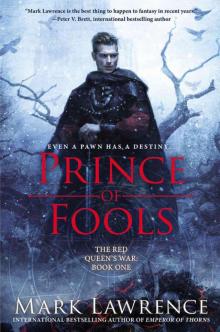 Prince of Fools
Prince of Fools Vodka Politics: Alcohol, Autocracy, and the Secret History of the Russian State
Vodka Politics: Alcohol, Autocracy, and the Secret History of the Russian State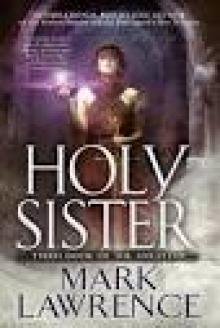 Holy Sister
Holy Sister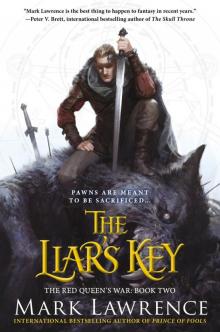 The Liar's Key
The Liar's Key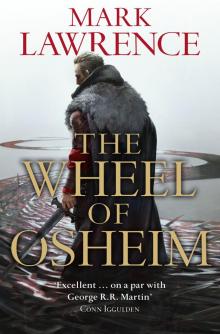 The Wheel of Osheim
The Wheel of Osheim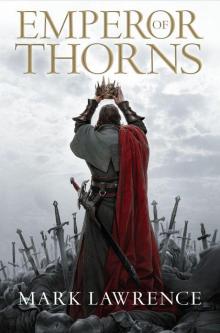 Emperor of Thorns
Emperor of Thorns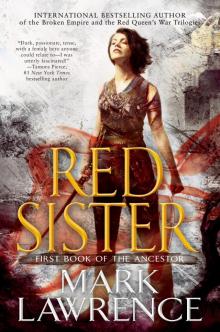 Red Sister
Red Sister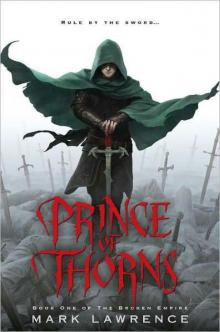 Prince of Thorns
Prince of Thorns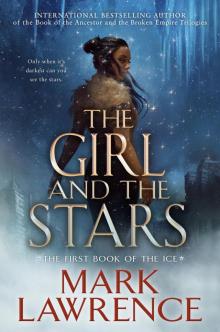 The Girl and the Stars
The Girl and the Stars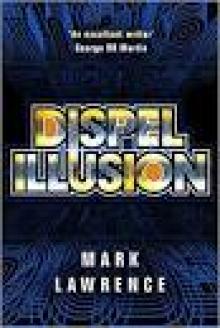 Dispel Illusion (Impossible Times)
Dispel Illusion (Impossible Times)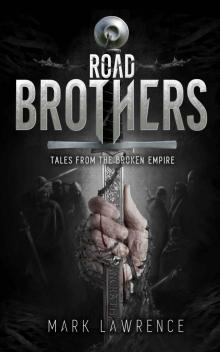 Road Brothers
Road Brothers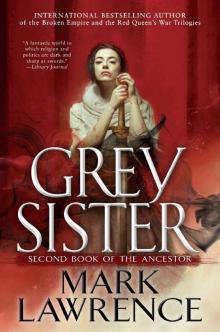 Grey Sister
Grey Sister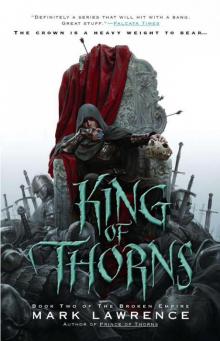 King of Thorns
King of Thorns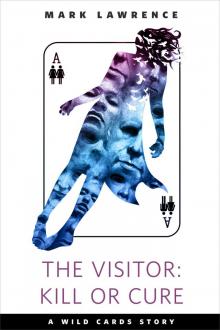 The Visitor--Kill or Cure--A Tor.com Original
The Visitor--Kill or Cure--A Tor.com Original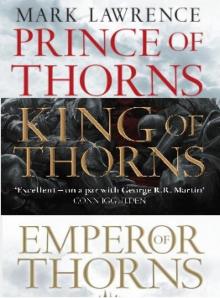 The Broken Empire Trilogy Omnibus
The Broken Empire Trilogy Omnibus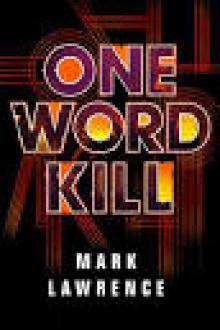 One Word Kill (Impossible Times Book 1)
One Word Kill (Impossible Times Book 1)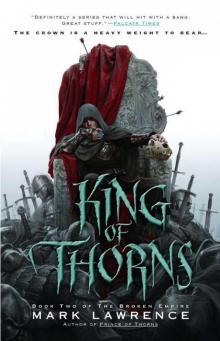 King of Thorns be-2
King of Thorns be-2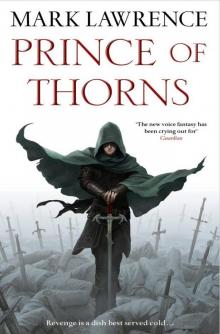 Prince of Thorns tbe-1
Prince of Thorns tbe-1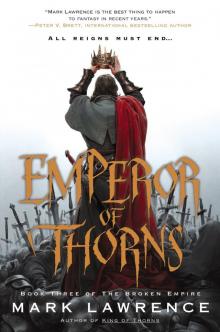 Emperor of Thorns tbe-3
Emperor of Thorns tbe-3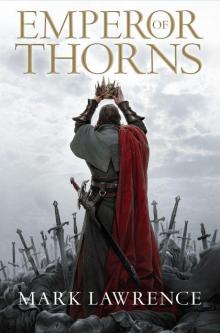 Emperor of Thorns (The Broken Empire, Book 3)
Emperor of Thorns (The Broken Empire, Book 3)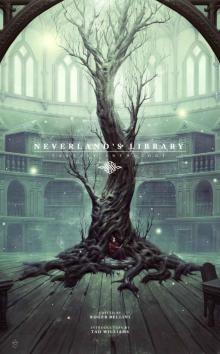 Neverland's Library: Fantasy Anthology
Neverland's Library: Fantasy Anthology